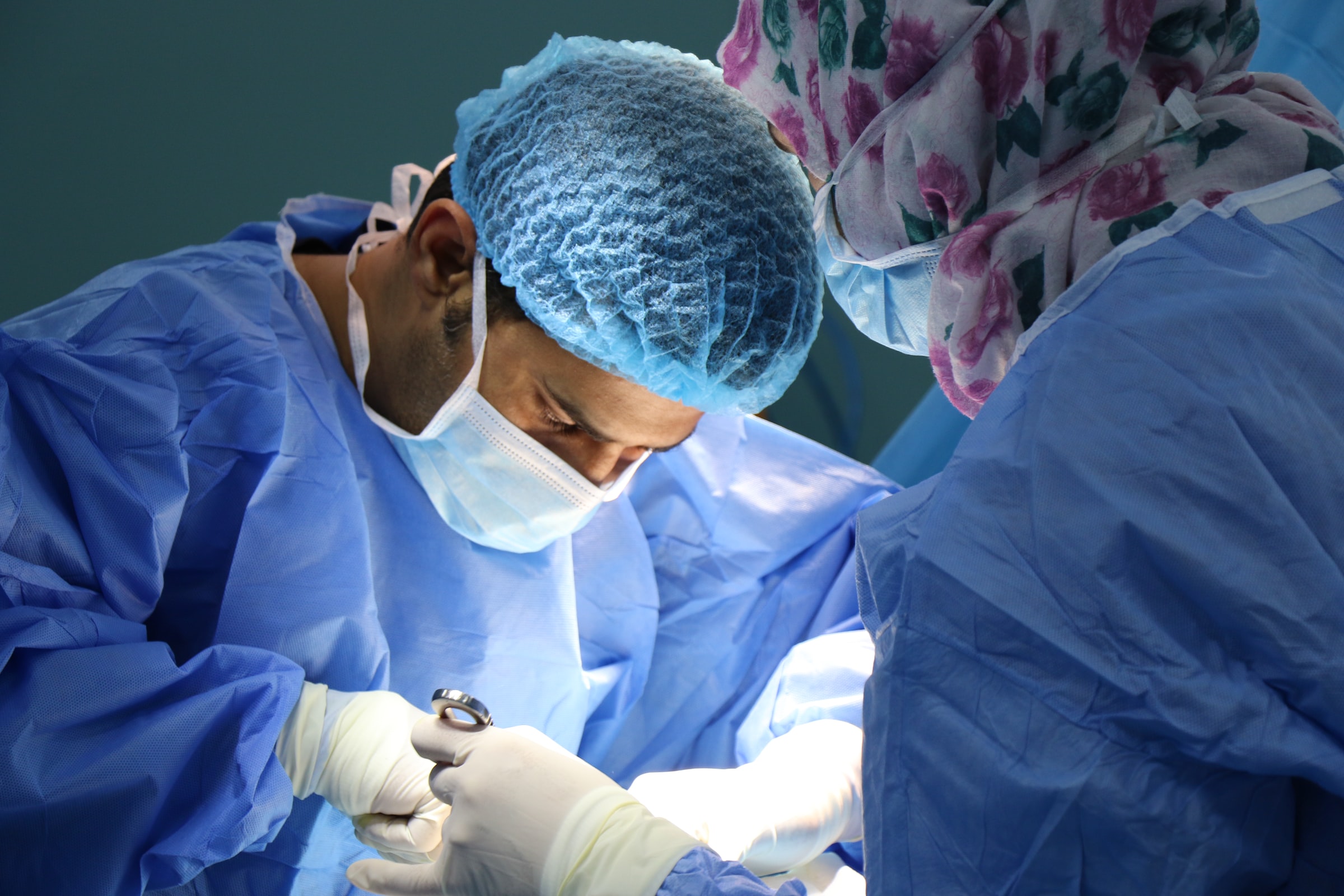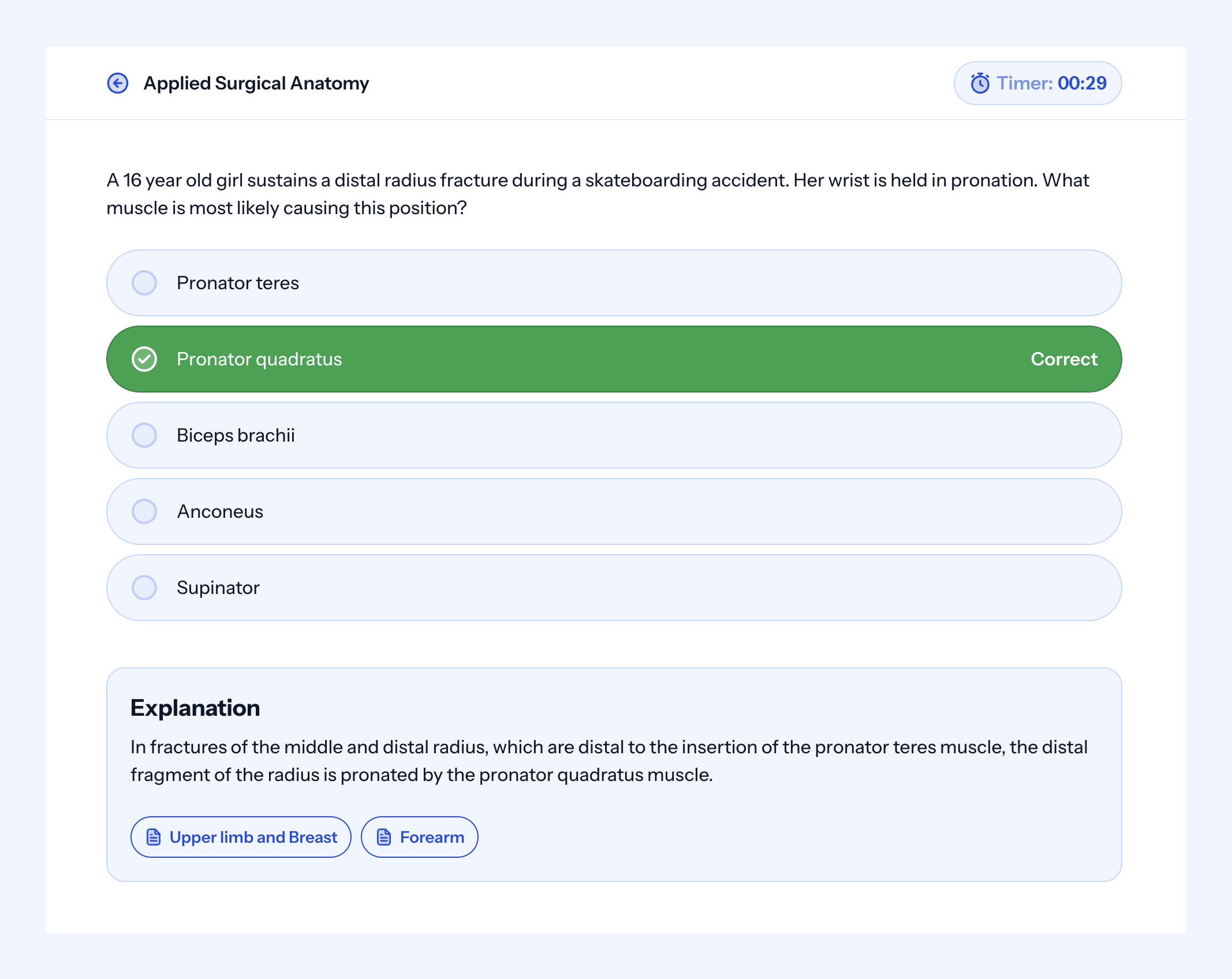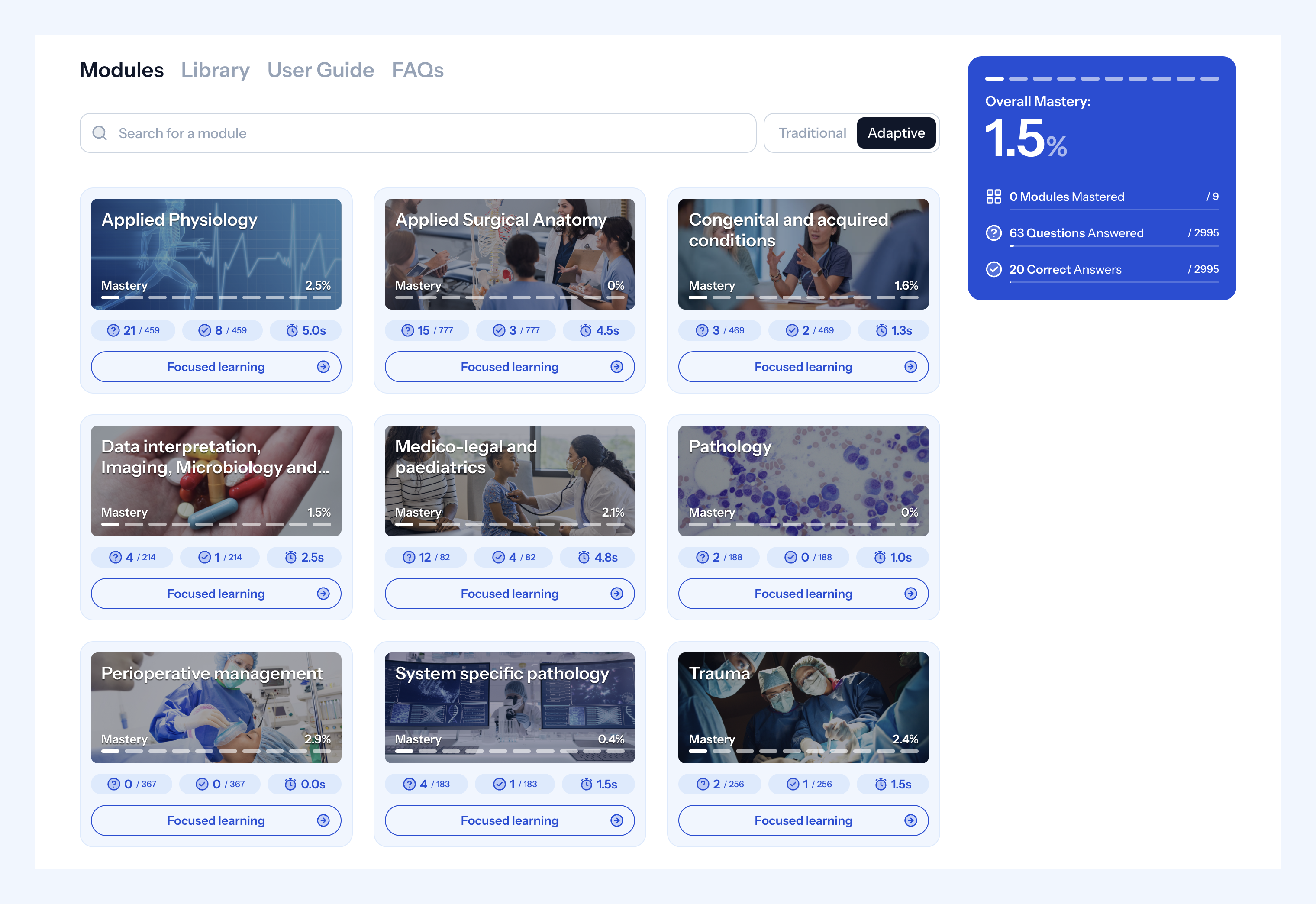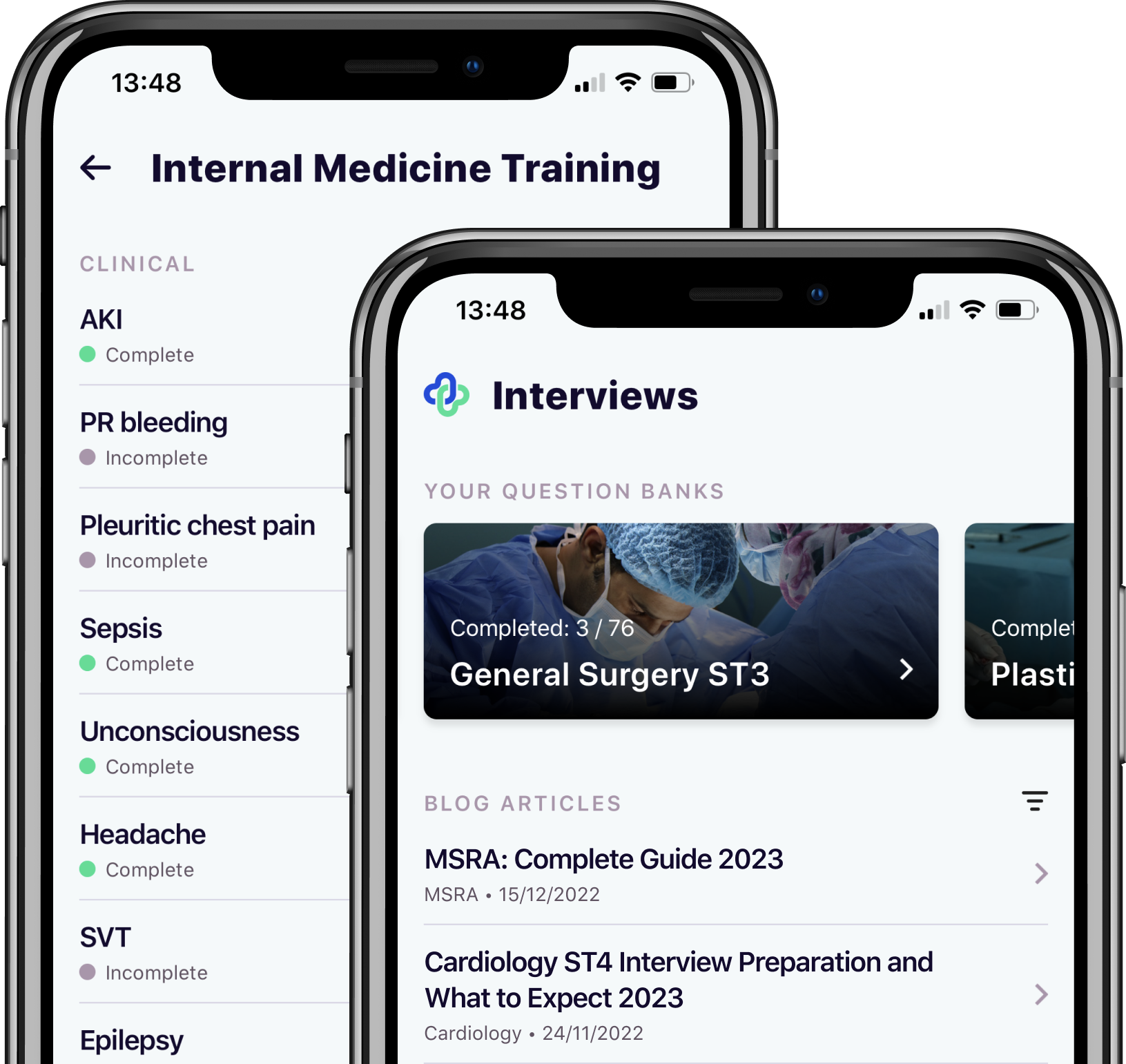
MRCS Part A Complete Guide
The MRCS Part A is a written paper and forms the first part of the exam for the Membership Examination of the Royal Colleges of Surgeons (MRCS), which assesses whether surgical trainees have the knowledge, skills, clinical competence and experience expected at the end of their core surgical training. The second part is an Objective Structured Clinical Examination (OSCE) (Part B). This comprehensive guide provides everything you need to know about applying, preparing for and undertaking MRCS Part A.
As well as allowing you to progress to higher levels of specialist surgical training, passing the MRCS (both Part A and Part B) and being awarded this postgraduate diploma grants membership to one of the four Royal Colleges of Surgeons of Great Britain and Ireland.
These four Royal Colleges of Surgeons, and therefore awarding bodies of the MRCS, are:
- The Royal College of Physicians and Surgeons of Glasgow
- The Royal College of Surgeons of Edinburgh
- The Royal College of Surgeons of England
- The Royal College of Surgeons of Ireland
The MRCS is an intercollegiate exam, meaning it is a common exam across the four Royal Colleges of Surgeons in the UK and Ireland, so you will undertake the same paper regardless of which college you choose to sit it with.
If you apply to any of the following specialties, you will need to complete the MRCS:
| Cardiothoracic Surgery ST3 | Plastic Surgery ST3 |
| Emergency Medicine ST3 | Trauma & Orthopaedic Surgery ST3 |
| General Surgery ST3 | Thoracic Surgery ST4 |
| Oral & Maxillofacial ST3 | Urology ST3 |
| Otolaryngology ST3* | Vascular Surgery ST3 |
| Paediatric Surgery ST3 | |
*MRCS (ENT)
The requirements and deadlines for completing the MRCS varies across the specialties. Always check the individual person specification for the specialty you’re interested in.
Guideline – MRCS Part A
Part A of the MRCS is a five-hour multiple choice exam, consisting of two papers, which must be completed on the same day (one AM and one PM). It assesses generic surgical sciences, applied knowledge and core knowledge required in all nine speciality areas (which can be found in the MRCS Part A questions section below).

This is an example of an MCQ from our MRCS Part A question bank. When you submit your answer, you will see if you have got it correct or incorrect, with an explanation and an option to learn more.
The two papers are as follows:
- Paper 1 – Applied Basic Sciences
- When: AM
- Duration: three hours – divided into two 90-minute sections with a 10-minute comfort break in between
- Number of questions: 180
- Paper 2 – Principles of Surgery in General
- When: PM
- Duration: two hours
- Number of questions: 120
To pass Part A of the MRCS exam, you must demonstrate a minimum level of competence in each of the individual papers and meet or exceed the combined pass mark for the two papers. The MRCS Part A allows six attempts at passing the exam. The adaptive Medibuddy MRCS Part A question bank will help guide your learning by not only showing you how many questions you have answered correctly, but also your “mastery” level, which is a measure of your knowledge of a given category based on how much of the syllabus you have shown the algorithm that you know so far. This is particularly useful when deciding which topics to focus your efforts on!

Requirements for MRCS Part A
Candidates undertaking the MRCS Part A will be required to demonstrate ‘knowledge of both applied basic science and principles of surgery in general to a level that a surgical trainee should have achieved two to three years after qualification’. The focus, therefore, of the MRCS Part A is on assessing your knowledge and skills across a wide range of surgical conditions – not only the area of surgery in which you hope to train – to ensure that you have the core basic knowledge and skills which are essential for successful higher training. Note: MRCS only tests knowledge ‘at the level expected of all trainees completing core training irrespective of their chosen specialty’.
More information about the MRCS syllabus and modules can be found in the MRCS Part A questions section below.
MRCS eligibility criteria
To be eligible for the MRCS exam, you must hold a primary medical qualification which is accepted by the UK General Medical Council (GMC) for full or provisional registration or by the Medical Council in Ireland for full or temporary registration. Candidates who qualified outside of the UK or Ireland must hold a primary medical qualification which is accepted by the Councils of the colleges. International graduates can find further guidance on the MRCS in our ‘MRCS for Overseas Doctors’ blog.
The Intercollegiate MRCS Exam website also provides further information on the eligibility requirements and how to check if your medical qualification is acceptable.
MRCS application
Applications for the MRCS Part A exam should be made through the relevant individual Royal College of Surgeons’ website – either the Royal College of Physicians and Surgeons of Glasgow; the Royal College of Surgeons of Edinburgh; the Royal College of Surgeons of England; or the Royal College of Surgeons of Ireland. The deadlines for applying for the upcoming MRCS Part A exams are listed in the section below.
MRCS Part A dates
The MRCS Part A exam is held three times per year, in January, April and September, simultaneously by each of the Royal Colleges of Surgeons. The 2026 exam dates, application deadlines and fees can be found in the table below:
| MRCS Part A exam date | Application closing date | Exam fee |
|---|---|---|
| 21 January 2026 | 30 October 2025 | £625 |
| 22 April 2026 | 12 March 2026 | £625 |
| 9 September 2026 | 1 July 2026 | £625 |
The MRCS Part A exam is expensive, so we have included a range of subscription options for the adaptive Medibuddy MRCS Part A question bank, so you can pick the most suitable one for you depending on your test date.
MRCS Part A test locations
During the COVID-19 pandemic, the MRCS Part A was temporarily delivered online. Since May 2022, the exam has been offered at Pearson Vue test centres at various locations within the UK, Ireland and internationally.
MRCS Part A results
The standard for the MRCS Part A exam is set using the ‘Angoff procedure’; you can find more information about what this entails on the Intercollegiate MRCS Exam website. This same process is used to set the standard for all MRCS Part A exams and ensures that the standard required to pass the exam is consistent for all. However, as each MRCS Part A exam is different, the pass mark for individual exams will vary each time.
When you complete the MRCS Part A exam, your marks for both papers (Paper 1: applied basic science and Paper 2: principles of surgery in general) will be combined to give you a total mark for Part A of the assessment. Following the exam, you’ll receive a breakdown of your marks, but no further feedback is provided.
The date you can access your MRCS Part A results will be specified on your MRCS exam documentation or provided when you complete the exam. Results will then be published on the individual Royal College of Surgeons’ website, through which you sat the exam, on the date given. Following this, you’ll also receive written confirmation of your results.
MRCS Part A questions
To gain an understanding of the knowledge and skills assessed as part of the MRCS exam, you should familiarise yourself with the MRCS syllabus. The ‘competence based’ curriculum identifies the applied and theoretical knowledge and practical skills, and professional behaviours, you’ll be required to demonstrate within the MRCS exam.
The syllabus is divided into the following ten modules, which you’ll be assessed on during the MRCS exam:
- Module 1: basic science knowledge relevant to surgical practice
- Module 2: common surgical conditions
- Module 3: basic surgical skills
- Module 4: the assessment and management of the surgical patient
- Module 5: perioperative care of the surgical patient
- Module 6: assessment and early treatment of the patient with trauma
- Module 7: surgical care of the paediatric patient
- Module 8: management of the dying patient
- Module 9: organ and tissue transplantation
- Module 10: professional behaviour and leadership skills
You can find a full breakdown of the topics covered and the number of questions for each in our MRCS Part A Preparation blog.
MRCS Resources
Aside from the MRCS syllabus and the recommended reading list (see below), practice questions and mock exams will be one of the most valuable resources for preparing for the MRCS exam. Using a mixture of practice questions and mock exams will ensure that you’re familiar with the types of questions you’ll be asked, have the opportunity to develop your responses and grow accustomed to dealing with the time pressure and demands of a full MRCS exam.
When it comes to choosing the most suitable resources for your revision, it’s important to consider the cost involved, the number of questions included and the quality of these questions, as well as the platform being used. We’ve included a comparison table below to show how different MRCS Part A resources compare.
 |
Passmedicine | Pastest | eMRCS | OnExamination | |
|---|---|---|---|---|---|
| Number of questions | 3,000 | 1,300 | 4,300+ | 2,000+ | 2,020+ |
| Price | £25+ | £15+ | £84+ | £35+ | £69.99+ |
| AI Personalised Learning |  |
 |
 |
 |
 |
| Mastery Level Calculated |  |
 |
 |
 |
 |
| Spaced Repetition |  |
 |
 |
 |
 |
To help you prepare for the MRCS Part A questions, the MRCS candidate guidance provides detailed information on the MRCS syllabus, including the objectives and knowledge relating to each of the modules above.
And to take your MRCS preparations to the next level, there’s our adaptive MRCS Part A Question Bank. Using artificial intelligence, our state-of-the-art algorithms tailor questions to you and focus on your areas for development, to help you progress faster and make more effective use of your MRCS preparation time.
MRCS books
The MRCS candidate guidance provides the following list of recommended textbooks for preparing for the MRCS exam:
Basic science textbooks
- Agur AMR, Dailey AF. Grant’s Atlas of Anatomy, 12e. Lippincott, Williams & Wilkins, 2008.
- Netter FH. Atlas of Human Anatomy, 5th edn. Saunders, 2010.
- Sinnatamby CS. Last’s Anatomy: Regional and Applied, 12th edn. Churchill Livingstone, 2011.
- Barrett KE, Barman SM, Boitano S, Brooks HL. Ganong’s Review of Medical Physiology, 23rd edn. McGraw-Hill, 2009.
- Kumar V, Abbas AK, Fausto N, Mitchell R. Robbins Basic Pathology, 8th edn. Saunders, 2007.
Clinical textbooks
- Garden OJ, Bradbury AW, Forsythe JLR, Parks RW. Principles and Practice of Surgery, 5th edn. Elsevier, 2007.
- Williams NS, Bulstrode CJK, O’Connell PR, eds. Bailey and Love’s Short Practice of Surgery, 25th edn. Hodder Arnold, 2008.
5 Tips to help you revise
As with all exams, effective revision will ensure that you are prepared for the MRCS and provide you with the best possible chance of performing well on the day. The following tips will help you to get the most out of your revision time:
- Consider when may be the best time to undertake the exam
Before you even book your test and begin revising, consider your current knowledge, skills and experience, and how prepared you are for the MRCS. Although you can take the MRCS earlier, provided you meet the eligibility criteria, the candidate guidance recommends that you undertake Part A in Specialty/Core Training Year 1 (ST/CT1) and Part B in Specialty/Core Training Year 2 (ST/CT2). Many people do pass Part A in their foundation years; however, it’s important to ensure that you have time to fully prepare, as you may risk wasting your limited attempts at passing the exams. - Familiarise yourself with the syllabus
As mentioned above, the MRCS syllabus outlines the knowledge, skills and behaviours assessed within the exam. Therefore, you can gain an understanding of what to expect within the exam, providing a useful starting point for identifying key areas for revision. - Dedicate time to the recommended reading
The MRCS candidate guidance advises that the recommended texts provide the level of knowledge required to successfully pass the exam. Mastery of the syllabus subjects, to the depth covered in the texts, and the ability to apply this knowledge in the context of surgical practice, is essential. In addition to this, you are expected to read beyond the recommended reading list in your preparations for the MRCS. However, many candidates find it difficult to revise from textbooks while working full-time. This is where using a high-quality question bank can help. Our adaptive MRCS Part A question bank contains all the resources you need to pass the exam, and using AI technology, it creates a personalised learning journey based on your individual strengths and weaknesses. - Utilise practice questions
While being familiar with the syllabus and recommended texts is valuable, dedicating time to completing practice questions will allow you to apply your knowledge and gain exam experience. Quality practice questions will also provide feedback, which will support you to develop your knowledge and skills, and help your revision progress. - Don’t skip practising full mock exams
In addition to helping you become familiar with the exam format, completing full practice tests will support you to prepare for the demands of a five-hour exam, which offers additional challenges. It’ll also provide you with a more realistic exam experience and expectation of what you can achieve in the given time frame and over the space of a five-hour exam.
For thousands of professionally written practice questions and tests, try out MRCS Part A question bank now.
You can find more support for preparing for the MRCS Part A exam, including how long to dedicate to exam preparation, in our ‘4 Most Common Mistakes Made by MRCS Candidates’ blog.

Take your subscriptions with you
Our mobile app allows you to access your interview and exam question banks wherever you are.




